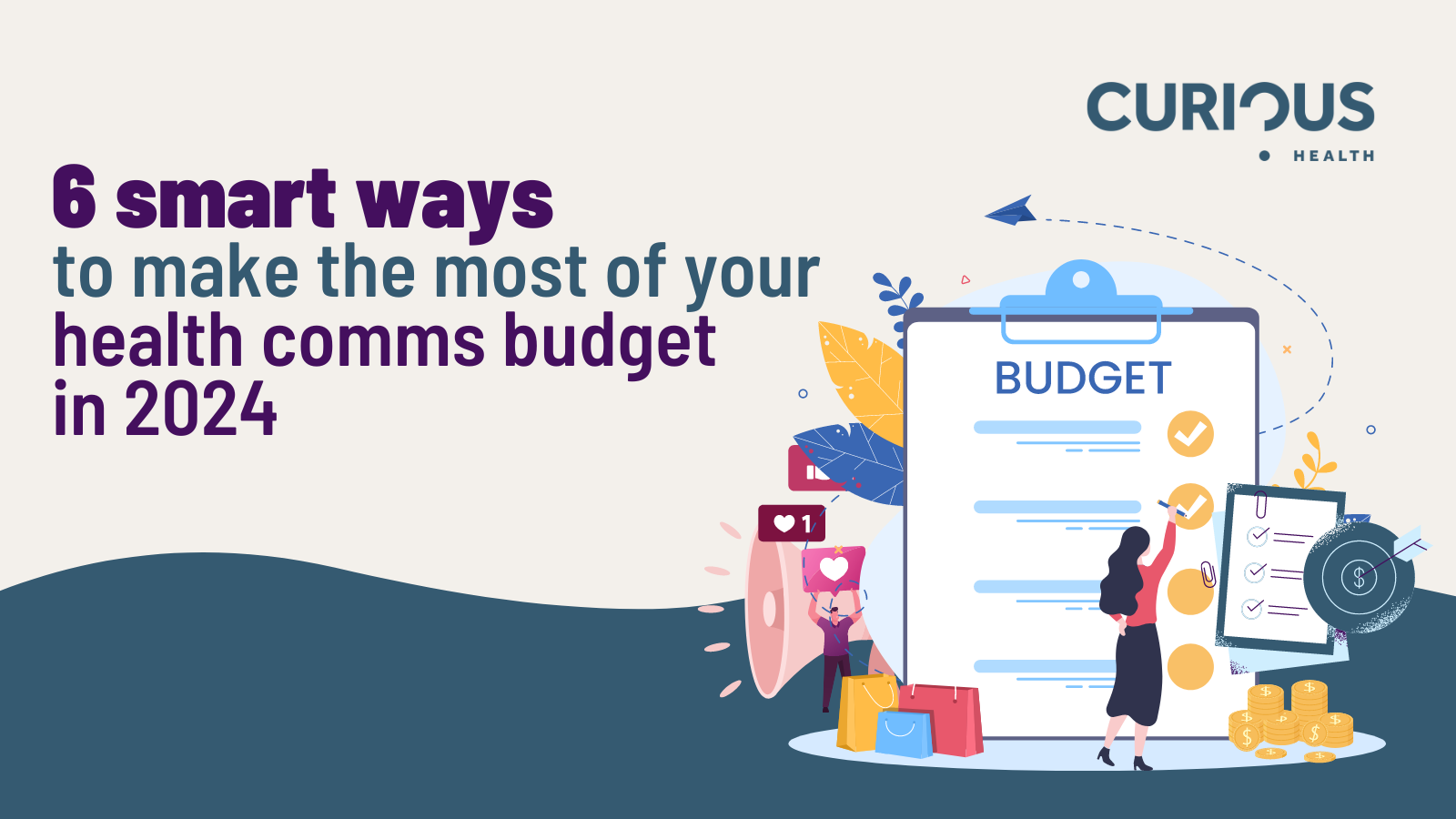6 smart ways to make the most of your health communications budget in 2024

As we move toward the end of the calendar year, marketing and communications budgets are being finalised. The challenge is to be both savvy with investment, whilst creating impactful health communications programmes.
When it comes to initiatives like patient activation, influencer programmes, events and creative campaigns, the need to demonstrate Return on Investment (ROI) and the cost-effectiveness of any initiative is a constant focus for each of the marketing disciplines. Particularly in today’s environment when budgets are constrained.
We’ve put together six clever ways to help you maximise your investment in 2024. If you find yourself with budget to spend before the end of your financial year, a number of these ideas can be implemented quickly and can inform your thinking for next year.
1. Be absolutely clear about what your stakeholders want from you
A lot of time and money is wasted on companies telling stakeholders what is important to them (the company), not what the audience is going to find valuable. The key to a successful health communications programme is to fully understand your audience, their pain points, and what questions they have; know what your area of expertise is and find the sweet spot in between. If you’re still in broadcast mode, you’re potentially wasting money on content that nobody will engage with.
2. Every piece of content created should have a defined purpose
Proudly stealing from the Google content strategy of Hero, Hub, Help, every piece of content should be created with a very deliberate purpose in mind. An emotive, authentic film to raise awareness; thought-leadership to bring in new customers; FAQs to capitalise on what audiences are searching for. You can then measure the impact of your content plan, asset by asset, and do more of what is working for you.
3. Content should be full of words you are optimising for, whilst still adding value
First and foremost, the content you create should be engaging and add value. This still leaves room to include terms that you know your audience is searching for. Whether part of a patient activation campaign, or med comms content on care standards for HCPs, your content should be searchable. If you can add backlinks from authoritative and relevant sources, this will also build online authority and make sure audiences can find you.
4. Bring agencies together earlier in the process and expect them to work well together
Marketing disciplines have long since merged and agencies will often offer similar expertise. It’s therefore important that everyone is clear at the outset what their remit is and they respect that. Getting agencies together early will also help with budget as people are all working off one agreed strategy. Creative can bring this to life through an impactful idea that aligns to the audience insight. Comms can ensure that they are delivering third party endorsement from patient groups, influencers etc, consider and manage reputational impact and secure earned content across media and social. Policy can shape the environment. Med comms can educate HCPs in a relevant way. Your performance agency will ensure it is all seen. When this doesn’t happen, pharma ends up with multiple strands of slightly different programmes that are costing more money and not working as hard in service of the strategy. Don’t assume this happens naturally with a full-service agency either.
5. Invest in Digital PR
Creating content and building relationships with stakeholders is most likely already part of your healthcare communications work and will help grow reputation. However, having a deliberate strategy for offsite SEO can turn these standard tactics into an engine to drive your online authority – ultimately reaching more of your audience with relevant, impactful content. And the best of all is that a well-executed digital PR campaign doesn’t require exorbitant costs to achieve success. Remember that digital PR isn’t just ‘doing PR online’.
6. Share more with your health comms agency
It is the agency’s responsibility to earn your trust and a place as part of your extended team. By sharing more about what is happening across the business, the agency can make connections that will deliver cost efficiencies. For example, someone on the c-suite is speaking at a conference? Great, let’s get their presentation, turn it into a blog and use excerpts across their social channels. An issue bubbling up over on this brand? Let’s think about how this may impact our planned campaign and mitigate any risk. This is why having regular access to senior people in the agency is important. They’re very used to spotting opportunities for the brand and making sure that you are looking good amongst your colleagues. If they’re adding value in this way, the higher hourly rate doesn’t feel like it is busting your budget.
If you are looking for ways to get budget-friendly yet impactful health communications programmes, get in touch with us today at [email protected] and let’s discuss your project.
Related blogs:
Digital PR is Not “Just Doing PR Online”
How to build strong partnerships with HCPs – Three-part series:
Part 1: Understanding HCP behaviours, challenges, and motivations
Part 2: Common pitfalls when engaging with HCPs
Part 3: The future of healthcare is here: AI-powered HCP relationships
